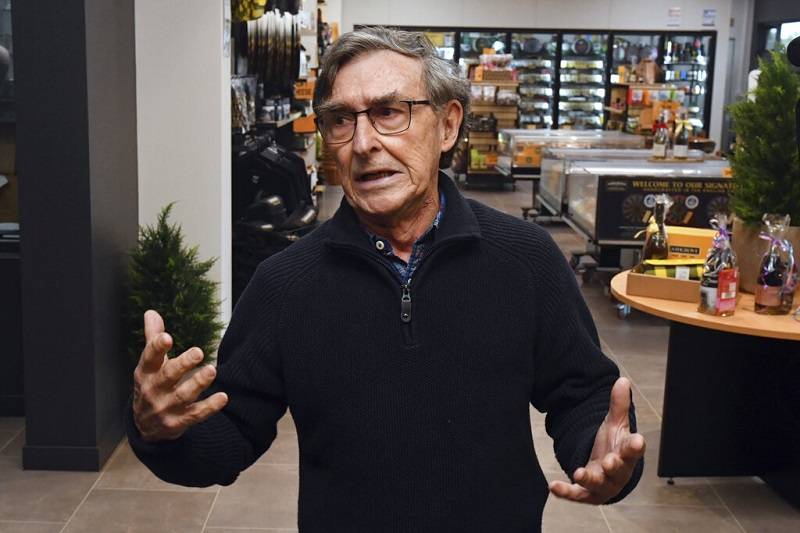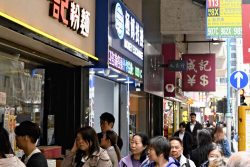
Former Australian High Commissioner to Solomon Islands Trevor Sofield gestures after he is stopped from speaking to Prime Minister Scott Morrison near Elizabeth Town, Australia, May 12, 2022.
17:46 JST, May 16, 2022
CANBERRA, Australia (AP) — A former Australian envoy to the Solomons Islands has accused Australia’s government of losing the trust of South Pacific island countries and of ushering in greater Chinese influence.
Retired career diplomat Trevor Sofield told a security summit on Monday he found it “inconceivable” that the Solomons government did not trust Australia enough to consult when a bilateral security pact with Beijing was first considered.
“That would not have happened a few years ago,” said Sofield, who was Australian high commissioner to the Solomons from 1982 to 1985.
The pact, which was concluded last month, has been a major issue ahead of Australian elections on Saturday.
Australia and its allies including the United States fear the pact will result in a Chinese naval presence less than 2,000 kilometers (1,200 miles) from the northeast Australian coast.
Prime Minister Scott Morrison argues that he is better able than opposition leader Anthony Albanese to take on the security threats posed by China and to strengthen relations with Washington, Australia’s most important defense partner.
Sofield, who was manhandled by security staff when he attempted to speak to Morrison at a campaign event last week, said Australia had “lost its way” in the Pacific as China scaled up its influence in the region.
“We had a vision,” he said. “It was underpinned by the fact that if we could assist these governments reach economic security through trade and aid then they would certainly be able to manage their own affairs.”
“But we’ve lost that vision and we’ve lost that trust that we developed over time,” Sofield added.
Albanese’s center-left Labor Party has condemned the Sino-Solomons pact as Australia’s worst foreign policy failure in the Pacific since World War II.
Morrison argues the blame lies with China for interfering in the Pacific.
Morrison boasts that a partnership with the United States and Britain announced in September that will supply Australia with a fleet of submarines powered by U.S. nuclear technology was as major achievement to boost Australia’s security.
The so-called AUKUS agreement has become a political battleground since an Australian newspaper reported on Saturday that the United States had set bipartisan support as a prerequisite for any agreement going ahead.
Morrison on Monday defended his failure to brief Labor earlier on the agreement and suggested the party’s deputy leader Rickard Marles might have leaked the nascent deal to the Chinese.
National security is traditionally seen as a strength of Morrison’s conservative coalition, which is seeking a rare fourth three-year term. Labor is ahead in most opinion polls, although the election result is expected to be close.
Top Articles in News Services
-

Prudential Life Expected to Face Inspection over Fraud
-

Hong Kong Ex-Publisher Jimmy Lai’s Sentence Raises International Outcry as China Defends It
-

Japan’s Nikkei Stock Average Touches 58,000 as Yen, Jgbs Rally on Election Fallout (UPDATE 1)
-

Trump Names Former Federal Reserve Governor Warsh as the Next Fed Chair, Replacing Powell
-

Suzuki Overtakes Nissan as Japan’s Third‑Largest Automaker in 2025
JN ACCESS RANKING
-

Japan Institute to Use Domestic Commercial Optical Lattice Clock to Set Japan Standard Time
-

Israeli Ambassador to Japan Speaks about Japan’s Role in the Reconstruction of Gaza
-

Man Infected with Measles May Have Come in Contact with Many People in Tokyo, Went to Store, Restaurant Around When Symptoms Emerged
-

China Eyes Rare Earth Foothold in Malaysia to Maintain Dominance, Counter Japan, U.S.
-

Prudential Life Insurance Plans to Fully Compensate for Damages Caused by Fraudulent Actions Without Waiting for Third-Party Committee Review
























